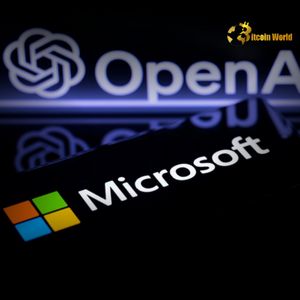OpenAI Microsoft Relationship: Unpacking Tensions Over Defense Deals
4 min read
BitcoinWorld OpenAI Microsoft Relationship: Unpacking Tensions Over Defense Deals In the fast-evolving world of artificial intelligence, strategic partnerships and competitive dynamics are constantly shifting. As companies like OpenAI push boundaries and secure major contracts, particularly in sensitive sectors like defense, questions arise about the stability of existing alliances. For cryptocurrency enthusiasts and tech watchers alike, understanding these power shifts is crucial, as they often dictate the pace of innovation and market direction. A recent development involving OpenAI and the U.S. Department of Defense highlights potential strains on the crucial OpenAI Microsoft relationship , sparking significant discussion. Understanding the OpenAI Defense Contract OpenAI recently secured a substantial $200 million contract with the U.S. Department of Defense (DoD). This deal marks a significant step for OpenAI into the defense sector, a move that has historically been met with mixed reactions within the tech community. For OpenAI, it represents a major revenue stream and an opportunity to apply its advanced AI capabilities to complex national security challenges. However, it also raises questions about the ethical implications of deploying powerful AI in military applications and how this aligns with the company’s stated mission and values. How Does This Impact the OpenAI Microsoft Relationship? Microsoft is OpenAI’s largest backer, having invested billions and providing essential computing infrastructure through Azure. This partnership has been foundational to OpenAI’s rapid development and scaling. Yet, reports of growing tensions between the two companies have surfaced, particularly as they increasingly compete for lucrative AI enterprise deals . The DoD contract adds another layer of complexity. While Microsoft is also a major defense contractor, OpenAI operating independently in this space could be seen as both a potential collaboration point and a source of competitive friction. Will this deal strengthen OpenAI’s independence to a degree that challenges Microsoft’s influence, or will it be viewed as a natural extension of OpenAI’s growth, albeit in a sensitive area? Silicon Valley’s Growing Ties to the Military The OpenAI/DoD deal is reflective of a broader trend: Silicon Valley’s increasingly cozy relationship with the military. After a period where many tech companies shied away from defense work due to ethical concerns voiced by employees and the public, there’s a noticeable shift. Industry leaders are now actively engaging with defense agencies, driven by factors like national security priorities, significant funding opportunities, and perhaps a changing perception of the role tech should play. Some voices are even calling for an AI “arms race,” arguing that staying ahead in AI development, particularly for defense, is critical for geopolitical reasons. This engagement raises important questions about the future direction of AI development and its primary applications. The Competition for AI Enterprise Deals Beyond defense, the competition for AI enterprise deals is heating up across all sectors. Both OpenAI and Microsoft are vying to provide AI solutions to businesses, government agencies, and organizations worldwide. Microsoft integrates OpenAI’s models into its products (like Copilot), but it also develops its own AI capabilities. OpenAI, while partnered with Microsoft, also pursues direct relationships with large customers. This overlap creates a natural tension. The DoD contract is essentially a very large, very specific enterprise deal. Its success or challenges could influence how other large organizations view contracting directly with OpenAI versus going through Microsoft’s integrated offerings. Navigating the Future of AI The dynamic between OpenAI, Microsoft, and the defense sector is a key indicator of the complex path ahead for artificial intelligence. The future of AI involves not just technological advancement but also navigating intricate business relationships, ethical considerations, and geopolitical forces. The $200 million DoD contract underscores that AI is no longer confined to research labs or consumer apps; it’s a critical component of national strategy and economic competitiveness. The ability of OpenAI and Microsoft to manage their partnership while pursuing independent goals, especially in sensitive areas like defense, will significantly shape the AI landscape for years to come. Other Signals from the Tech Landscape The recent discussions around the OpenAI/Microsoft dynamic were part of a broader conversation about key events in the tech world. Other highlights from the week included: Examining the implications of public figures like Vice President JD Vance joining social platforms like Bluesky. Analyzing surprising acquisitions, such as Wix buying a young startup focused on “vibe coding” for a significant sum, prompting debate on emerging tech trends and terminology. Insights from industry experts on what constitutes valuable technical talent in an era increasingly dominated by AI tools and capabilities. These diverse topics collectively paint a picture of a tech industry in constant flux, driven by innovation, market forces, and evolving societal interactions. Conclusion: A Partnership Under Pressure? OpenAI’s significant deal with the U.S. Department of Defense is more than just a contract; it’s a litmus test for its relationship with its most important partner, Microsoft. While collaboration remains strong in many areas, the increasing competition for major deals, particularly in strategic sectors like defense, introduces undeniable friction. The outcome of this dynamic will not only influence the trajectory of both companies but also the broader direction of AI development, its integration into critical infrastructure, and the ongoing debate about the role of tech in national security. It’s a complex situation worth watching closely as the future of AI unfolds. To learn more about the latest AI market trends, explore our article on key developments shaping AI features. This post OpenAI Microsoft Relationship: Unpacking Tensions Over Defense Deals first appeared on BitcoinWorld and is written by Editorial Team

Source: Bitcoin World



